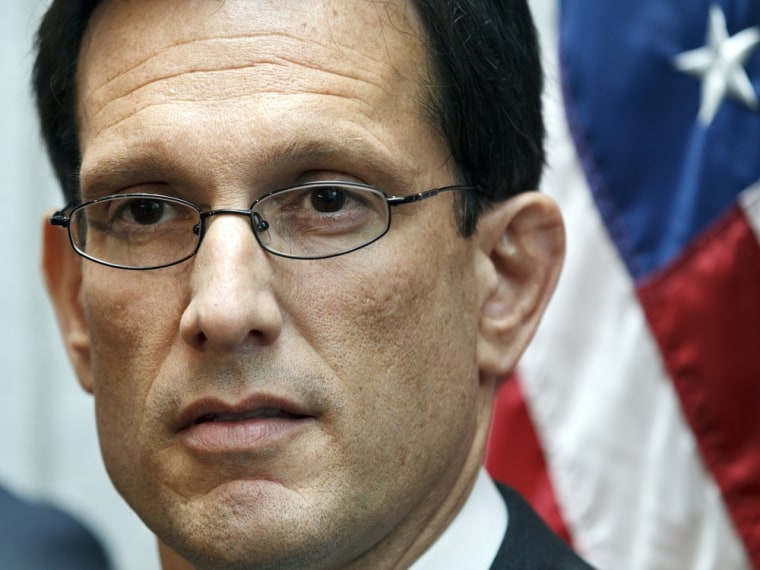The distinction between legislating and politicking will blur this summer on Capitol Hill, as House Republicans lay out a laundry list of priorities largely intended to set the stage for this fall’s election.
Majority Leader Eric Cantor, R-Va., outlined the GOP's priorities through August in a memo to fellow Republican lawmakers on Friday.
The agenda calls for votes on some items of substance -- reforms of the U.S. Postal Service and Food and Drug Administration among them -- but seems largely intended to shape Republicans' messaging efforts when they stand for re-election.
"In line with our underlying principles for legislation, the House will move forward this summer with a number of proposals aimed at addressing job creation and the economy, reducing spending, and shrinking the size of the federal government while protecting and expanding liberty," Cantor wrote. "Above all, we must continue to focus on economic growth and small business -- producing results that get Americans back to work."
But the most consequential votes taken by the House are set for this summer, and very few of the proposals likely to pass through the House are expected to become law. The period between late June and the yearly August recess will be dominated by pillars of the GOP's re-election effort: energy, taxes, and regulations.
Republicans will push legislation to expand energy exploration after Father's Day, just as the driving season kicks into high gear for motorists and gas prices are set to explode.
Read Cantor's memorandum on the majority leader's website
In July, Republicans will embark on a number of efforts, many spearheaded by the freshmen lawmakers first elected in 2010, to eliminate regulations -- an effort, Cantor said, to spur job creation and assist small business owners.
And before breaking for recess, Cantor wrote that the House would vote "on legislation preventing the largest tax increase in history." While the GOP is working on comprehensive tax reform, Cantor said that such an intiative would "take time," necessitating an extension of the Bush-era tax cuts past Dec. 31, when a previous two-year extension of those tax cuts is set to expire.
But the agenda outlined by the Republicans is starkly different than the "to-do" list being pushed by President Barack Obama as the campaign season hits its stride.
That list includes efforts to expand tax credits for small business hiring, proposals to spur clean energy manufacturing, and initiatives for employers who keep jobs that could be outsourced in the United States. Obama has also pushed for a veterans-hiring campaign, and expanded refinancing for Americans with troubled mortgages.
The two sides' agendas shape the contours of the fall's battle for control of Congress. Republicans are looking to emphasize their efforts to rein in spending and cut regulatory rules, in part to appease a conservative base that was frustrated toward the GOP's role in last year's spending fights. While Obama and Democrats point to a "do-nothing" Congress, accusing it of doing nothing tangible to spur job growth.
Underscoring the record-low unpopularity of Congress, Obama has taken strides, too, in tying Republican rival Mitt Romney to GOP lawmakers.
NBC-Marist polls: Dems have slight edge in three key Senate races
"After a long and spirited primary, Republicans in Congress have found a nominee for president who has promised to rubber-stamp this agenda if he gets the chance," he told cheering supporters in during his official campaign launch earlier this month.
And on Thursday in Iowa, Obama noted the electorate's frustration toward Congress's inaction.
"It's always easier to be cynical. It's always easier to say nothing can change, especially after we've gone through such a tough time," he said.
"And despite all the changes we've made, despite all the good things we've done, things are still tough. And so, the other side, they are going to try and play on that sense that, well, things aren't perfect, Congress is still arguing, the politics is still polarized. But you're the antidote to that."
Case-in-point was the standoff on Thursday that saw no resolution between Democrats and Republicans on separate bills to extend low student low rates, something which both Obama and Romney have endorsed.
The Senate rejected the House bill to extend the lower interest rates on student loans because it contained a veritable poison pill for Democrats: a provision to pay for the cost of the bill by axing a part of the president's health care reform law. The Democratic version, which leaned on eliminating a tax break for the wealthy, also failed to secure the necessary votes for passage.
Cantor made no mention of that impasse in his memo to colleagues on Friday. Barring action by Congress, student loan rates will double on July 1.
